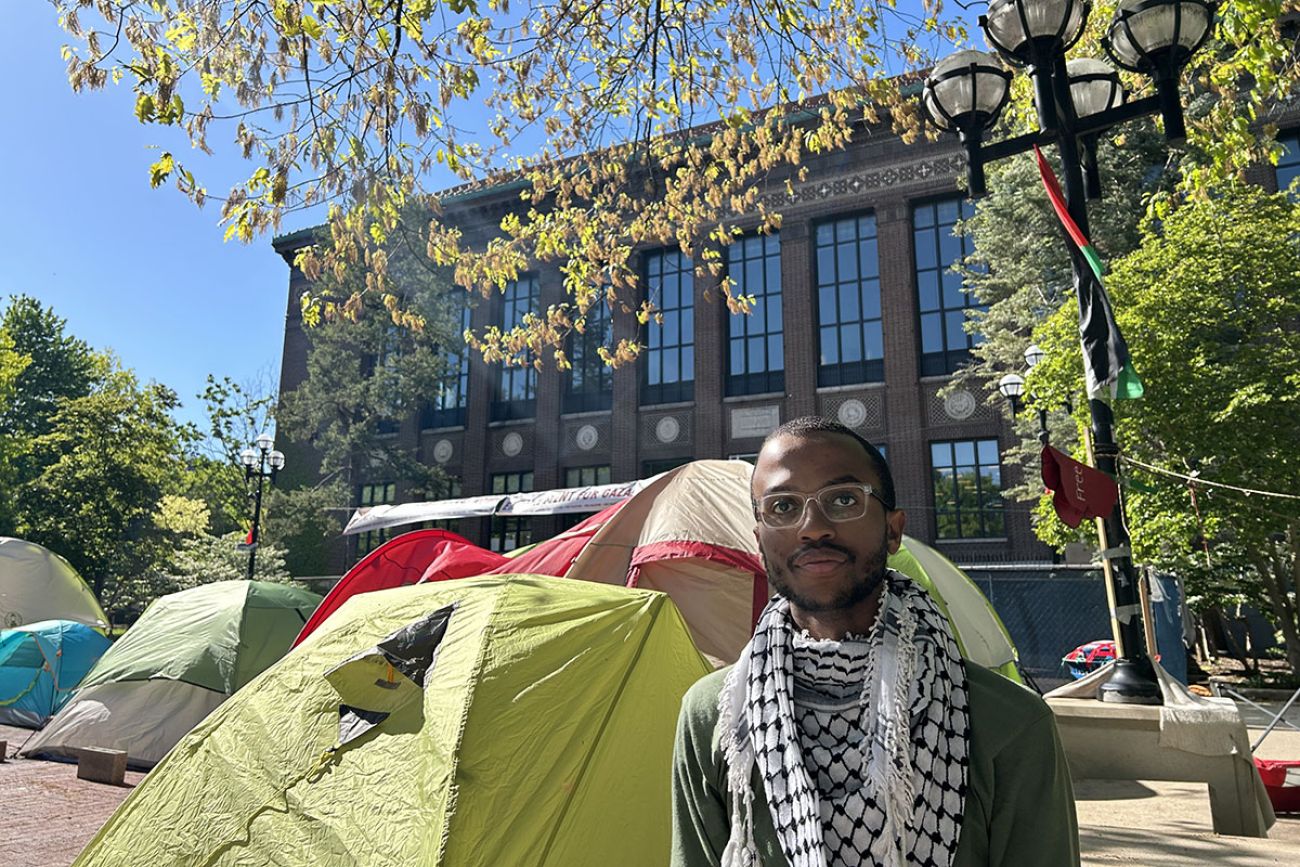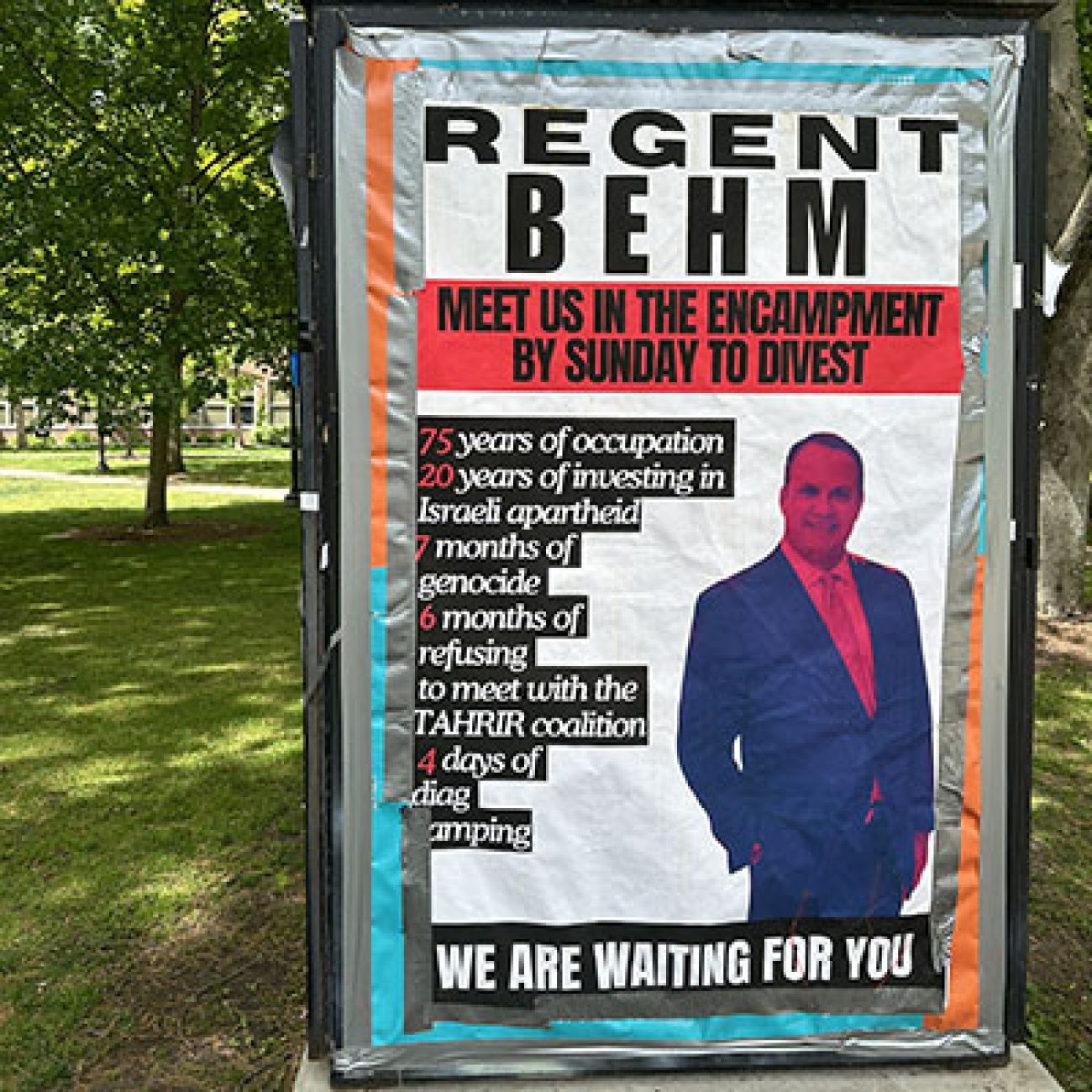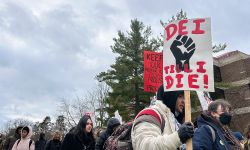Pro-Palestinian camp continues at U-M amid national arrests, negotiations

- Roughly 50 to 60 tents remain on the University of Michigan campus despite the semester being over
- Some universities have formed agreements with students campers to end camping, others have spurred arrests
- University of Michigan officials have said they do not plan on changing their investment decisions related to Israel
ANN ARBOR — Pro-Palestinian demonstrators at the University of Michigan Ann Arbor campus are showing little sign of letting up even after other students cleared out campus following graduation.
While national news outlets had largely left, more than 50 tents remained as of Friday morning, and demonstrators again vowed to continue their fight until the university "divests" from Israel by cutting any financial ties during that country’s ongoing war with Hamas.
Students are still camping to “exercise solidarity with Gazans,” said Josiah Walker, the external director at Students Allied for Freedom and Equality, the University of Michigan chapter of Students for Justice in Palestine.

Here is a look at what is happening at Michigan, and how it compares to other demonstrations across the country:
‘Resistance’
U-M made national news Saturday when dozens of students disrupted a commencement ceremony by chanting and holding up Palestine flags. A night earlier, state police arrested one person in a related demonstration.
Nearly a week later, tensions have calmed but demonstrators remain.
Related:
- An arrest, more protests at University of Michigan graduation events
- Whitmer, Thanedar take heat over Israel-Hamas war
- Pro-Palestinian protests spread to Michigan State amid nationwide arrests
There were Palestine flags hanging from trees and light poles. A large banner declared “long live the intifada,” a controversial phrase.
While President Joe Biden and groups like the Anti-Defamation League of Michigan have denounced the term, graduate student Ember McCoy defended its use.
“Intifada literally means ‘uprising,’” she told Bridge Michigan. “It refers to the resistance movement so when we use that phrase, it’s referring to the Palestinian resistance to the occupation.”
Demonstrator arrests
U-M students on April 22 joined peers across the country in encampment demonstrations following the arrest of more than 100 students at Columbia University.
There have been more than 2,800 arrests at universities across the country during protests about the war, according to a tally by The Associated Press.
Conflicts continued on some campuses this week as police reportedly arrested demonstrators at the University of Pennsylvania and George Washington University, among others.
But administrators have reached agreements with students to end demonstrations at some schools, including Brown, Northwestern, Rutgers and The University of California at Riverside.
Congressional review
The Rutgers and Northwestern presidents are expected to testify in front of a U.S. House Committee later this month.
U-M President Santa Ono was asked to testify but it appears he will now do a transcribed interview instead.
Ryan Silberfein, president of Michigan Hillel, said the “university is well within their rights to take down these tents and posters,” but instead it’s become “increasingly difficult” for Jewish students to walk through the Diag.
Silberfein said understands the university does not want to escalate the situation but said it feels “isolating” to be a Jewish student on campus.
‘A visual reminder’
There have been other demonstrations at some Michigan universities, but U-M’s encampment is the longest standing encampment in the state.
An encampment at Michigan State University lasted for three days.
The U-M encampment “kind of serves as a visual reminder of what’s happening in Gaza,” said McCoy, a camper and graduate student.
McCoy told Bridge she does not think the encampment’s power weakens just because the semester is over.
A former leader in the graduate student employee union, she referenced a graduate student worker strike that went into the summer last year. Back then, “people worried that the semester dictated our power, I don’t necessarily think that’s the case.”
Divestment
Some schools have made concessions to end demonstrations, including measures related to endowment transparency, disciplinary action against students and efforts to support Palestinian and Muslim students.
But U-M officials do not appear willing to negotiate.

“Since the events of Oct. 7, the president and other university leaders have met many times with students on all sides of this issue to better understand their concerns,” university spokesperson Colleen Mastony said in a statement.
“Representatives from Student Life and the Division of Public Safety and Security have been in close contact with students involved in the encampment.”
The TAHRIR Coalition, a group of 90+ student organizations, asserts that U-M “commits over $6 billion to investment managers who have profited from investments in Israeli companies and/or military contractors.”
U-M countered those assertions this week in a new report on the school’s $17.9 billion endowment.
The university has “no direct investment in any Israeli company” but less than $15 million in funds that may include companies based in Israel, the report said.
McCoy, the graduate student demonstrator, said she thinks U-M is making a “political choice” by choosing not to divest, or choosing to ignore the implications of these investments.
Michigan Education Watch
Michigan Education Watch is made possible by generous financial support from:
Subscribe to Michigan Education Watch
See what new members are saying about why they donated to Bridge Michigan:
- “In order for this information to be accurate and unbiased it must be underwritten by its readers, not by special interests.” - Larry S.
- “Not many other media sources report on the topics Bridge does.” - Susan B.
- “Your journalism is outstanding and rare these days.” - Mark S.
If you want to ensure the future of nonpartisan, nonprofit Michigan journalism, please become a member today. You, too, will be asked why you donated and maybe we'll feature your quote next time!






